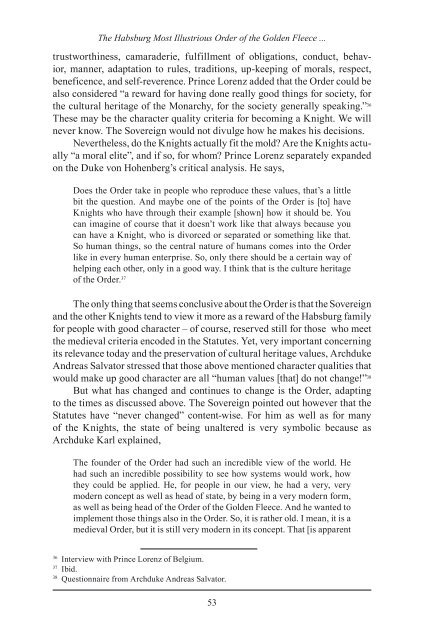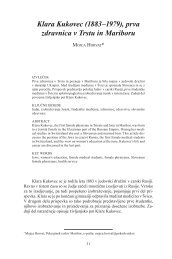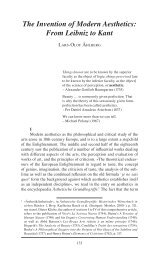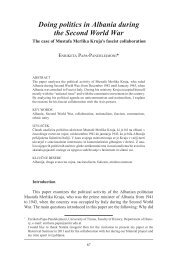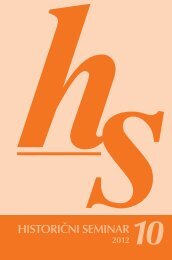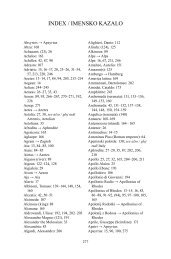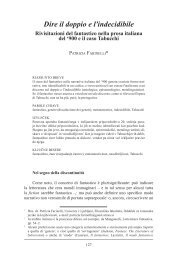The Habsburg Most Illustrious Order of the Golden Fleece: Its ...
The Habsburg Most Illustrious Order of the Golden Fleece: Its ...
The Habsburg Most Illustrious Order of the Golden Fleece: Its ...
Create successful ePaper yourself
Turn your PDF publications into a flip-book with our unique Google optimized e-Paper software.
<strong>The</strong> <strong>Habsburg</strong> <strong>Most</strong> <strong>Illustrious</strong> <strong>Order</strong> <strong>of</strong> <strong>the</strong> <strong>Golden</strong> <strong>Fleece</strong> ...<br />
trustworthiness, camaraderie, fulfillment <strong>of</strong> obligations, conduct, behavior,<br />
manner, adaptation to rules, traditions, up-keeping <strong>of</strong> morals, respect,<br />
beneficence, and self-reverence. Prince Lorenz added that <strong>the</strong> <strong>Order</strong> could be<br />
also considered “a reward for having done really good things for society, for<br />
<strong>the</strong> cultural heritage <strong>of</strong> <strong>the</strong> Monarchy, for <strong>the</strong> society generally speaking.” 36<br />
<strong>The</strong>se may be <strong>the</strong> character quality criteria for becoming a Knight. We will<br />
never know. <strong>The</strong> Sovereign would not divulge how he makes his decisions.<br />
Never<strong>the</strong>less, do <strong>the</strong> Knights actually fit <strong>the</strong> mold? Are <strong>the</strong> Knights actually<br />
“a moral elite”, and if so, for whom? Prince Lorenz separately expanded<br />
on <strong>the</strong> Duke von Hohenberg’s critical analysis. He says,<br />
Does <strong>the</strong> <strong>Order</strong> take in people who reproduce <strong>the</strong>se values, that’s a little<br />
bit <strong>the</strong> question. And maybe one <strong>of</strong> <strong>the</strong> points <strong>of</strong> <strong>the</strong> <strong>Order</strong> is [to] have<br />
Knights who have through <strong>the</strong>ir example [shown] how it should be. You<br />
can imagine <strong>of</strong> course that it doesn’t work like that always because you<br />
can have a Knight, who is divorced or separated or something like that.<br />
So human things, so <strong>the</strong> central nature <strong>of</strong> humans comes into <strong>the</strong> <strong>Order</strong><br />
like in every human enterprise. So, only <strong>the</strong>re should be a certain way <strong>of</strong><br />
helping each o<strong>the</strong>r, only in a good way. I think that is <strong>the</strong> culture heritage<br />
<strong>of</strong> <strong>the</strong> <strong>Order</strong>. 37<br />
<strong>The</strong> only thing that seems conclusive about <strong>the</strong> <strong>Order</strong> is that <strong>the</strong> Sovereign<br />
and <strong>the</strong> o<strong>the</strong>r Knights tend to view it more as a reward <strong>of</strong> <strong>the</strong> <strong>Habsburg</strong> family<br />
for people with good character – <strong>of</strong> course, reserved still for those who meet<br />
<strong>the</strong> medieval criteria encoded in <strong>the</strong> Statutes. Yet, very important concerning<br />
its relevance today and <strong>the</strong> preservation <strong>of</strong> cultural heritage values, Archduke<br />
Andreas Salvator stressed that those above mentioned character qualities that<br />
would make up good character are all “human values [that] do not change!” 38<br />
But what has changed and continues to change is <strong>the</strong> <strong>Order</strong>, adapting<br />
to <strong>the</strong> times as discussed above. <strong>The</strong> Sovereign pointed out however that <strong>the</strong><br />
Statutes have “never changed” content-wise. For him as well as for many<br />
<strong>of</strong> <strong>the</strong> Knights, <strong>the</strong> state <strong>of</strong> being unaltered is very symbolic because as<br />
Archduke Karl explained,<br />
<strong>The</strong> founder <strong>of</strong> <strong>the</strong> <strong>Order</strong> had such an incredible view <strong>of</strong> <strong>the</strong> world. He<br />
had such an incredible possibility to see how systems would work, how<br />
<strong>the</strong>y could be applied. He, for people in our view, he had a very, very<br />
modern concept as well as head <strong>of</strong> state, by being in a very modern form,<br />
as well as being head <strong>of</strong> <strong>the</strong> <strong>Order</strong> <strong>of</strong> <strong>the</strong> <strong>Golden</strong> <strong>Fleece</strong>. And he wanted to<br />
implement those things also in <strong>the</strong> <strong>Order</strong>. So, it is ra<strong>the</strong>r old. I mean, it is a<br />
medieval <strong>Order</strong>, but it is still very modern in its concept. That [is apparent<br />
36 Interview with Prince Lorenz <strong>of</strong> Belgium.<br />
37 Ibid.<br />
38 Questionnaire from Archduke Andreas Salvator.<br />
53


